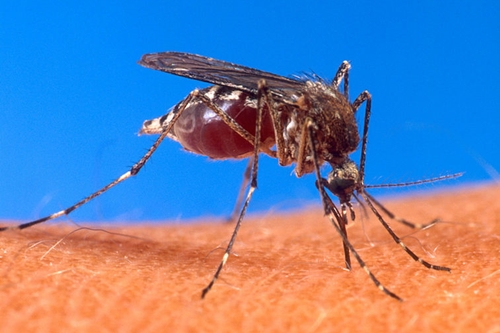2 July 2015. A variety of mosquito, engineered to produce offspring that die before maturity, was found to reduce the dengue mosquito population in a city in Brazil by 95 percent, well below the level needed to spread the disease. The team from the biotechnology company Oxitec Ltd. in Abingdon, U.K., with academic and business colleagues in the U.K. and Brazil, published its findings today in the journal PLoS Neglected Tropical Diseases.
Dengue is viral disease transmitted by infected mosquitoes (not person-to-person) that occurs most frequently in tropical urban regions of the world. World Health Organization estimates from 50 to 100 million dengue infections occur each year, with half of the world’s population at risk. WHO says the disease is now endemic in more than 100 countries, especially in Asia, Africa, the Americas, eastern Mediterranean, and Pacific islands.
The disease is a collection of four major types, but all types can cause high fever, severe headache, muscle and bone pain, and bleeding. Dengue hemorrhagic fever is a severe form of the disease that can cause respiratory problems, severe bleeding, and organ failure, and become fatal. There are no treatments for dengue other than caring for symptoms, and up to now, no vaccines to prevent its occurrence.
Dengue is spread by the Aedes aegypti mosquito. Oxitec uses genetic engineering techniques to insert a gene in males of the species that when released into the wild mate with females and produce offspring that die before becoming adults, and thus are prevented from having offspring. As a result the Aedes aegypti mosquito population in the area of the release is markedly reduced or eliminated.
Oxitec, a spin-off company from Oxford University, is currently testing its engineered mosquito, code-named OX513A, in field trials. The journal paper reported on one of those trials, in the Itaberaba suburb of Juazeiro city in Bahia State, Brazil, a region known to have a high incidence of dengue disease. The research team tested the engineered OX513A mosquito in an area of Itaberaba with 424 houses where 1,810 people reside. An adjacent area with 5,716 people living in 1,341 houses and a similar population density, but not exposed to the engineered mosquitoes, served as a comparison.
The team used ovitraps, devices that capture eggs from mosquitoes used for surveillance of the species, to track the number of mosquitoes in the test and comparison regions for a 1 year period, February 2011 to January 2012. The OX513A mosquitoes also had a fluorescent marker that appears in the eggs, which made it possible to follow the numbers engineered versus wild-type mosquitoes.
The results show the density of Aedes aegypti mosquitoes declined from 418 per hectare to 20 per hectare (1 hectare = 2.47 acres), a reduction of 95 percent, while densities in the adjacent region not receiving the engineered mosquitoes remained about the same over the period. A similar Oxitec study in Grand Cayman Island in 2010 found a similar, but not quite as dramatic reduction of 82 percent. The results of the later trial in Brazil, say the authors, suggest that the lower numbers of dengue-carrying mosquitoes could be below levels needed to spread the disease among human populations, according to accepted mathematical models of dengue transmission.
Other cities in Brazil are already beginning to use Oxitec’s engineered mosquitoes to control dengue. In May 2015, the Brazilian city of Piracicaba received approval from the nation’s biosafety authorities to begin a municipal dengue mosquito control program using Oxitec’s varieties.
Read more:
- Synthetic Spider Silk Developed with Customized Properties
- Patent Awarded for Plant Gene Sequence Engineering
- Plant Science Biotech Gets Genome Editing Technology
- University Breeds Genome-Edited Pigs
- Genetically Engineered Medflies Found to Control Wild Types
* * *


 RSS - Posts
RSS - Posts
[…] Engineered Mosquitoes Sharply Reduce Dengue Carriers […]